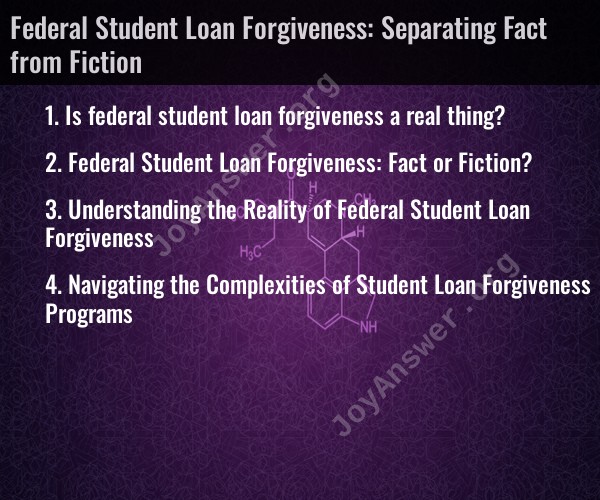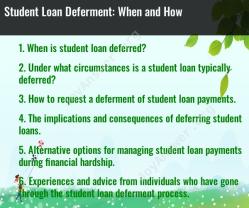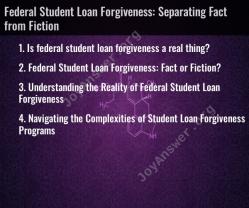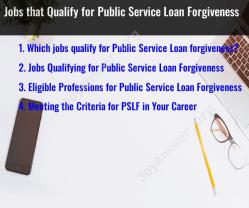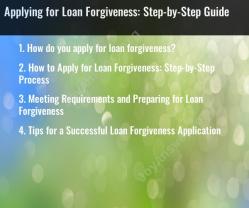Is federal student loan forgiveness a real thing?
Federal student loan forgiveness is indeed a real program offered by the U.S. government. It allows borrowers to have their federal student loans partially or fully forgiven under certain circumstances. However, there can be confusion and misinformation surrounding this topic. It's essential to separate fact from fiction when it comes to federal student loan forgiveness.
Here are some key points to consider:
Fact: There are legitimate federal student loan forgiveness programs:
Public Service Loan Forgiveness (PSLF): This program forgives the remaining student loan balance for individuals who work full-time for qualifying public service employers, such as government and nonprofit organizations, after making 120 qualifying payments.
Teacher Loan Forgiveness: This program offers loan forgiveness for teachers who work in low-income schools or educational service agencies for a specified period.
Income-Driven Repayment Plan Forgiveness: Under certain income-driven repayment plans (e.g., Income-Based Repayment, Pay As You Earn, Revised Pay As You Earn), borrowers may be eligible for loan forgiveness after 20-25 years of qualifying payments.
Fact: There is no universal, one-size-fits-all forgiveness program:
Federal loan forgiveness programs have specific eligibility criteria, and they don't apply to all borrowers. Eligibility depends on factors such as the type of loan, the repayment plan, the employer, and the borrower's profession.
Fact: Loan forgiveness may be subject to taxation:
In some cases, the forgiven loan amount may be considered taxable income, which can result in a tax liability for the borrower.
Fiction: All federal student loans are eligible for forgiveness:
Not all federal student loans are eligible for forgiveness. Only Direct Loans are eligible by default. However, other federal loans can become eligible through consolidation into a Direct Consolidation Loan.
Fiction: Loan forgiveness is easy to obtain:
Qualifying for loan forgiveness can be complex and may require years of commitment. Borrowers must meet specific criteria, including making a certain number of qualifying payments and working in eligible fields.
Fiction: All student loan forgiveness proposals will become law:
There have been discussions and proposals for broad student loan forgiveness in the past, but not all of these proposals have become law. Any changes to student loan forgiveness programs would require legislative action.
It's important for borrowers to research and understand the specific forgiveness programs and eligibility criteria that apply to their situation. Consulting with their loan servicer or a financial advisor can help them navigate the complexities of federal student loan forgiveness and make informed decisions about their student loans.
Federal Student Loan Forgiveness: Fact or Fiction?
Federal student loan forgiveness is a reality, but it is not as simple as some people may think. There are a variety of federal student loan forgiveness programs available, but each program has its own specific eligibility requirements and application process.
Some of the most common federal student loan forgiveness programs include:
- Public Service Loan Forgiveness (PSLF): PSLF forgives the remaining balance on your Direct Loans after you have made 120 qualifying monthly payments while working full-time for a qualifying employer.
- Teacher Loan Forgiveness: Teacher Loan Forgiveness forgives up to $17,500 in federal student loans for teachers who work full-time for five consecutive years in a low-income school district.
- Income-Driven Repayment (IDR) Forgiveness: IDR Forgiveness forgives the remaining balance on your Direct Loans after you have made 20 or 25 years of qualifying monthly payments under an IDR plan.
Understanding the Reality of Federal Student Loan Forgiveness
It is important to understand the reality of federal student loan forgiveness before you decide to pursue it.
Here are some things to keep in mind:
- Federal student loan forgiveness programs are not for everyone. Each program has its own specific eligibility requirements, and not everyone will qualify.
- The application process can be complex and time-consuming. It is important to carefully read the program requirements and to gather all of the necessary documentation before you submit your application.
- Federal student loan forgiveness can have tax implications. For some programs, the forgiven amount may be considered taxable income.
Navigating the Complexities of Student Loan Forgiveness Programs
If you are considering pursuing federal student loan forgiveness, there are a few things you can do to navigate the complexities of the process:
- Educate yourself about the different programs available. Be sure to read the program requirements carefully and to understand the eligibility criteria.
- Gather all of the necessary documentation. This may include your employment history, tax returns, and loan statements.
- Submit your application carefully and accurately. Be sure to answer all of the questions and to provide all of the required documentation.
- Stay in touch with your loan servicer. They can help you track your progress towards forgiveness and answer any questions you have about the process.
Federal student loan forgiveness can be a great way to reduce your student loan debt, but it is important to understand the reality of the process before you decide to pursue it. By educating yourself about the different programs available, gathering all of the necessary documentation, and submitting your application carefully and accurately, you can increase your chances of success.
If you need help navigating the complexities of federal student loan forgiveness programs, you can contact a student loan counselor. Student loan counselors can provide you with free and unbiased advice on your options.
